“Modded Out” Analog Bass Line Synthesizer with VCO, MIDI-Controllable VCF and Sub-Harmonics Oscillator
-
“Modded Out” Bass Line synthesizer featuring the most legendary modifications
-
Pure analog signal path based on legendary VCO, VCF and VCA designs
-
Sawtooth and square waveform VCO with transistor wave-shaping circuitry
-
Amazing 4-pole low-pass resonant filter with cut-off, resonance, envelope, decay and accent controls
-
Easy-to-use 16-step sequencer with 7 tracks, each with 250 user patterns
-
Filter frequency fully controllable via MIDI C/C
-
Earth-shattering sub-harmonics oscillator with switchable output level
-
Authentic analog slide circuitry with external slide control
-
Slide Time control allows for variable slide time (up to 6 times longer)
-
Sweep Speed switch features 3 accent speed modes (slow, norm, fast)
-
Accent Sweep switch features 3 sweep combinations with high resonance mode
-
Filter FM control modulates frequency of the filter from the audio output of the VCA
-
Muffler circuitry features post VCA distortion with full bass response
-
Dedicated Accent push button to manually activate the accent
-
Soft Attack control for wide range of attack times for non-accented notes
-
Normal control for wide range of decay time for non-accented notes
-
Accent control for wide range of decay time for accented notes
-
Filter Tracking control for filter frequency tracking of the current note
-
Overdrive control adds insane spice and edge to your sounds
-
Massive amount of CV and Gate in/outs for extreme creativity
-
16-voice Poly Chain allows combining multiple synthesizers for up to 16-voice polyphony
-
Premium quality VRs featuring high resolution and metal shafts for long lifecycle
-
15 controls and 33 switches to give you direct and real-time access to all important parameters
-
MIDI and USB implementation with MIDI channel and Voice Priority selection
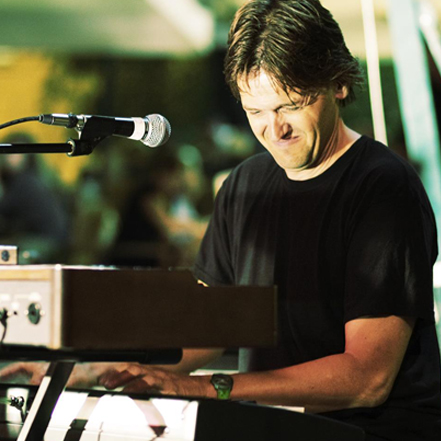
TD-3-MO
Sometime after the release of the original TB-303, creative users realized that there was more to squeeze out of an already amazing bass machine, to produce sounds that were unique to themselves. As word started spreading about third-party mods adding more functions and many more ways to shape sounds, synth-heads around the world wanted to get their hands on a modded TB-303. Now it’s a lot easier to get that awesome “modded-out” sound with the Behringer TD-3-MO-AM, an ultra-affordable and faithful homage to the iconic synthesizer that’s capable of creating some fiery basslines and much more.
With its pure analog signal path, 16-step sequencer and authentic VCO, VCF and VCA filters, the TD-3-MO-AM is sure to become one of your favorite synthesizers.

Pure Analog Signal Path
Great care has been taken in engineering the TD-3-MO-AM, including the true to the original VCO, VCF and VCA designs and pure analog circuitry with matched transistors. This highly-focused attention to detail is what gives TD-3-MO-AM its ultra-flexible sound shaping capability, which covers a wide spectrum for you to create some super-funky bass lines and pounding rhythms that can keep you, and the crowd, grooving all night long.

Rock Right Out of The Box!
Your TD-3-MO comes ready to rock, thanks to its default signal routing that doesn’t require lifting a single patch cable to instantly create amazing sounds. The highly-intuitive layout lets you easily tap into the inspired sounds of 1980s and ’90s wave, EDM and synth-pop music tracks that made history – or to design incredibly fat and original sounds that will make you a legend in your own right!
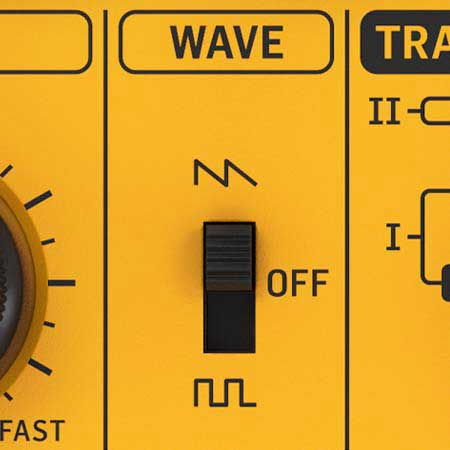
Vintage Oscillator
The TD-3-MO includes an ultra-flexible sawtooth and square waveform Voltage Controlled Oscillator (VCO) that can be tuned, shaped and even overdriven just the way you want. The amazing 4-pole low-pass resonant filter has controls for cutoff, resonance, envelope, decay and accent that you can adjust and tweak to add tension and spice to your songs. When you want to go even lower, you can tap the Sub Oscillator button giving you an extra octave, more low end and a deeper sound.
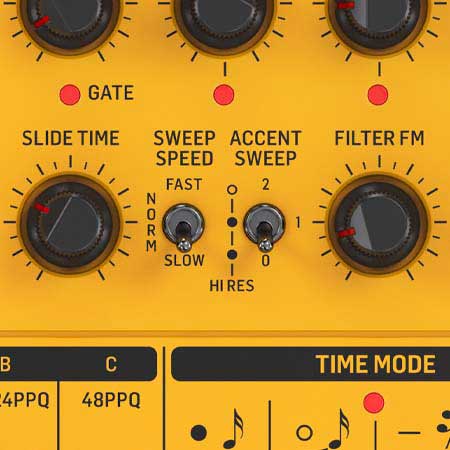
More Features
Because it’s a “modded out” version of the original TD-3, there’s a whole plethora of amazing new features that will surely let you set your music apart such as a MIDI C/C controllable filter, variable slide time control, three-mode Sweep Speed switch, Accent Sweep Switch, a Soft Attack control and so much more! The TD-3-MO is a truly a great addition to your current setup so you can start creating those tasty beats and basslines that you’ve always wanted.
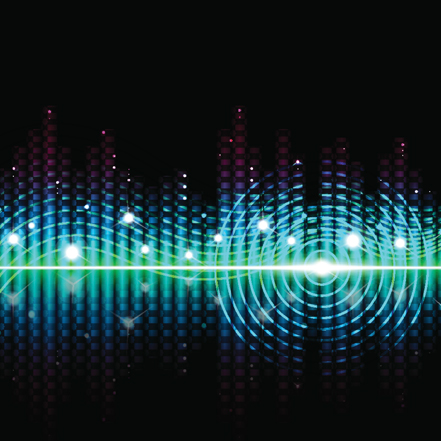
Onboard Sequencer and Arpeggiator
The onboard sequencer with 7 tracks allows you to program up to 16 steps of notes and rests and save them as a Pattern. You can record, save and recall up to 250 patterns, all of which can be stored in the 4 Groups. Your sequences can be played either in Keyboard mode, where you create and store the pattern, or Step mode which allows you to interact while composing a pattern. The onboard Arpeggiator features wide patterns you can build to provide a virtually-endless array of sound effects. Both the sequencer and arpeggiator in the TD-3-MO are fun, mesmerizing and totally addictive.
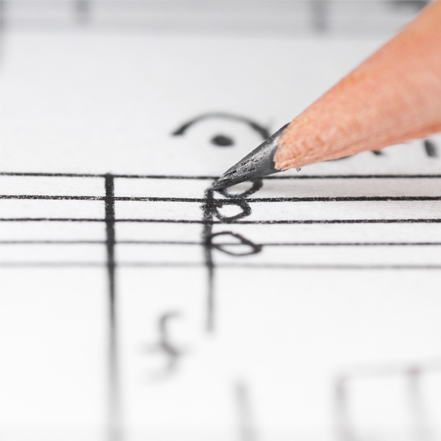
16-Note Poly Chain Ready
While it is a monophonic instrument (one note at a time), TD-3-MO’s 16-note Poly Chain function lets you combine multiple synthesizers for up to 16-voice polyphony - plus, it provides vastly improved reliability and stability over its 1970s and '80s predecessors.

Controls and Connectivity
We just can’t help ourselves – like you, we're gear-heads, too. For those who want the numbers, TD-3-MO has 15 controls and 33 switches to give you direct and real-time access to all important parameters, all laid out in a highly-intuitive format that puts the joy back into your music creation. And you can expand TD-3-MO’s tone-sculpting capabilities beyond your wildest dreams by utilizing the multi-I/O patchbay to connect external devices!
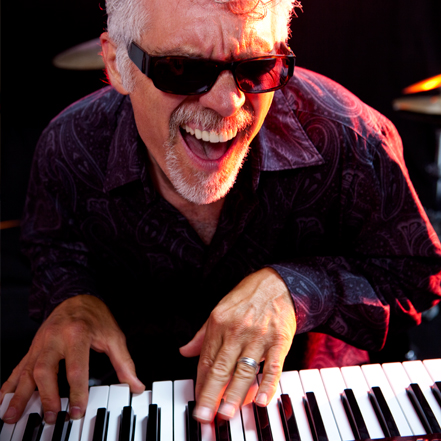
Unleash Your Imagination
When it comes to not just pushing envelopes but creating them, TD-3-MO gives your imagination its voice – and it’s so very affordable. When modern performance calls for classic analog sound – it calls for the Behringer TD-3-MO!
Visit your dealer to experience the stunning TD-3-MO or get yours online today. Music never felt this good!
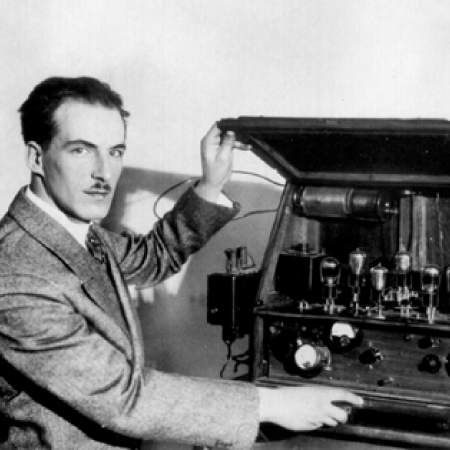
A Brief History of Analog Synthesis
The modern synthesizer’s evolution began in 1919, when a Russian physicist named Lev Termen (also known as Léon Theremin) invented one of the first electronic musical instruments – the Theremin. It was a simple oscillator that was played by moving the performer’s hand in the vicinity of the instrument’s antenna. An outstanding example of the Theremin’s use can be heard on the Beach Boys iconic smash hit “Good Vibrations."
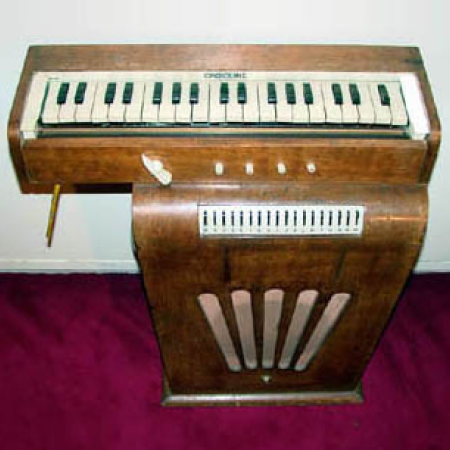
Ondioline
In the late 1930s, French musician Georges Jenny invented what he called the Ondioline, a monophonic electronic keyboard capable of generating a wide range of sounds. The keyboard even allowed the player to produce natural-sounding vibrato by depressing a key and using side-to-side finger movements. You can hear the Ondioline on Del Shannon’s “Runaway."
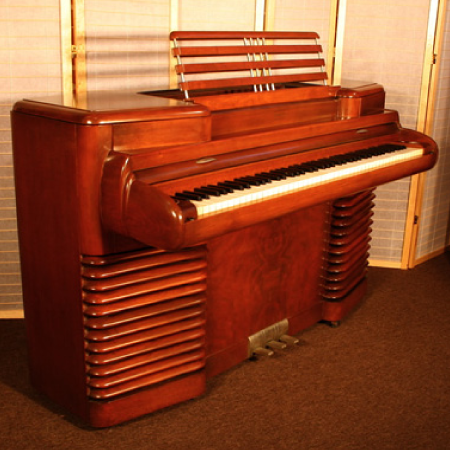
Storytone Piano
Designed by famous piano manufacturer Story & Clark in association with RCA, the Storytone piano debuted at the 1939 New York World’s Fair. Hailed as the world’s first electric piano, the Storytone is prized by musicians and collectors alike for its realistic piano sound – only 500 or so were ever built.
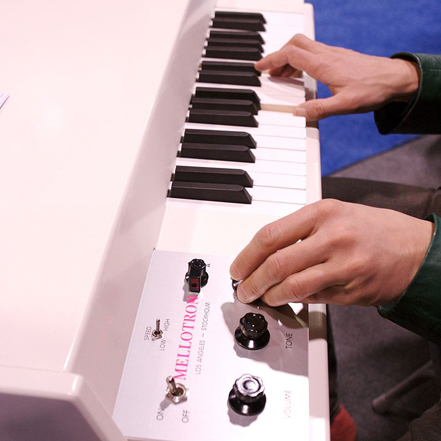
Mellotron
Finding a high level of acceptance in the 1960s, Harry Chamberlin’s Mellotron was an electro-mechanical keyboard that generated sounds by playing back pre-recorded tape loops. Although tempermental and prone to pitch and mechanical issues, the Mellotron was used extensively by many U.K. artists. Classic tracks from the Moody Blues “Days of Future Passed,” the Beatles “Strawberry Fields Forever,” and the Rolling Stones “She’s a Rainbow” are prime examples. Attribute author: By Buzz Andersen from San Francisco, California, United States Mellotron | NAMM 2007.
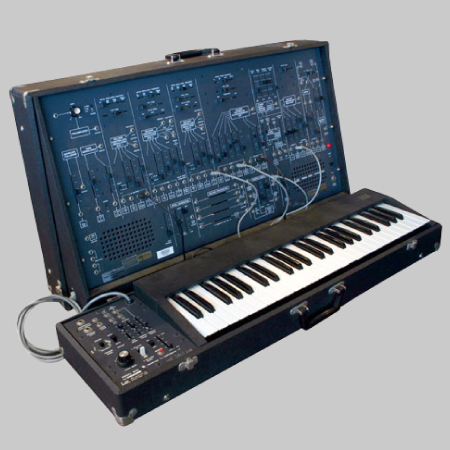
Arp 2600
Manufactured by ARP Instruments, Inc., the Arp 2600 was one of the most successful synthesizers to come out of the 1970s. They were ideal for players new to the synth world, and allowed patches to be changed via switches or 1/8" audio cables. The list of recordings and artists that used the venerable Arp 2600 reads like a veritable Who's Who of rock, pop and jazz, and includes The Who, David Bowie, John Lennon, Depeche Mode, Edgar Winter, Frank Zappa and Herbie Hancock – to name just a few. An Arp 2600 was even used to create the voice of the Star Wars character R2-D2. Attribute author: The original uploader was Kimi95 at Italian Wikipedia -http://www.vintagesynth.com/arp/arp2600blue.jpg e http://www.vintagesynth.com/arp/arp.php, CC BY 3.0, https://commons.wikimedia.org/w/index.php?curid=7708499
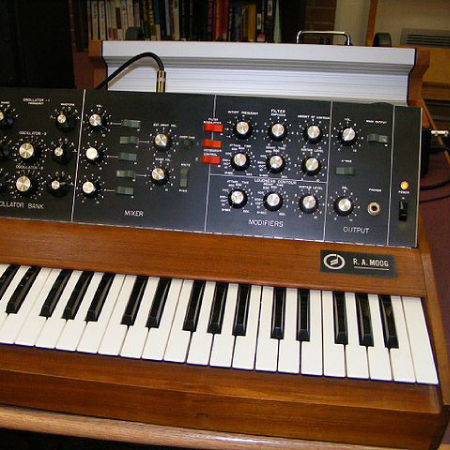
Minimoog
Designed to replace the large, modular synths being used in pop music at the time, Bill Hemsath and Robert Moog developed the Minimoog in 1971. The monophonic instrument became the first truly all-in-one, portable analog synthesizer. Thanks to its 3 oscillators and 24 dB/octave filter, the Minimoog produces an extremely rich and powerful bass sound and is still in high demand today. Yes keyboardist Rick Wakeman said the instrument “absolutely changed the face of music.” Attribute author: glacial23 - Early Minimoog Uploaded by clusternote, CC BY-SA 2.0
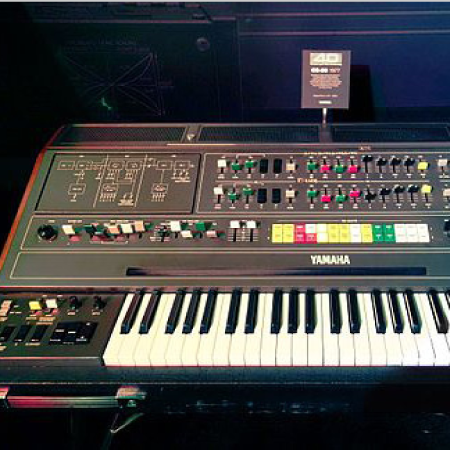
Yamaha CS-80
In 1976, Yamaha released their CS-80 8-voice polyphonic synthesizer, which provided velocity-sensitive keys and aftertouch that worked on individual voices. The analog instrument featured a ribbon controller, which allowed the user to perform polyphonic pitch bends and smooth glissandos. Composer Vangelis used the CS-80 extensively in the Blade Runner and Chariots of Fire soundtracks. The CS-80 also provided the bass line heard in the BBC 1980 series Doctor Who theme song. Image attribution: Pete Brown from Gambrills, MD, USA (DSC00539) [CC BY 2.0 (http://creativecommons.org/licenses/by/2.0)], via Wikimedia Commons
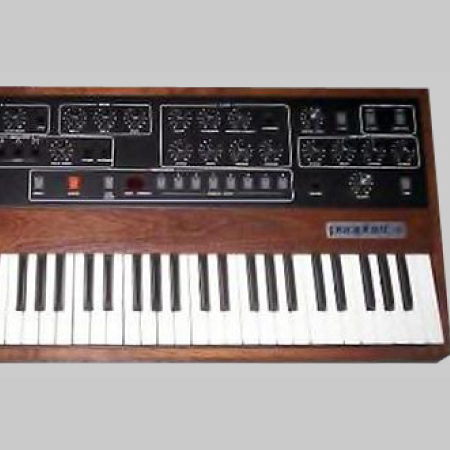
Sequential Circuits Prophet 5
Sequential Circuits introduced the Prophet 5, which was the first analog 5-voice polyphonic synthesizers to provide onboard memory storage of all patch settings for instant recall. The great-sounding Prophet 5 revolutionized the synthesizer world and, in spite of its rather expensive price tag, became one of the most successful synths of all time. Designed by Dave Smith and J owen, the Prophet 5 was the keyboard of choice by a very long list of performers that includes Peter Gabriel, Philip Glass, Journey, The Cars, Thomas Dolby, Duran Duran, Gary Numan, Pink Floyd, and countless others. Image attribution: original uploader was Felix2036 at Dutch Wikipedia derivative work: Clusternote (Sequential_Circuits_Prophet_5.jpg) [Public domain], via Wikimedia Commons Which brings us to 1977.
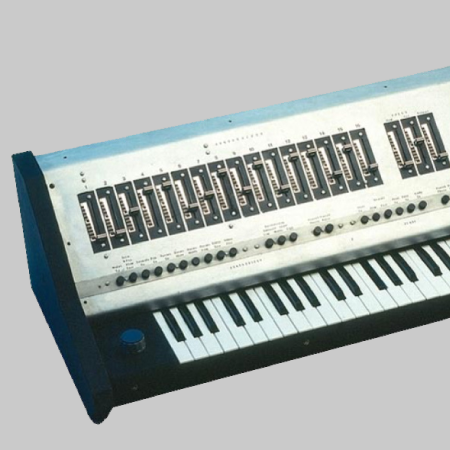
A Passion for Keyboards
Our founder, Uli Behringer has a deep passion for keyboards. Born in the small town of Baden, Switzerland in 1961, Uli grew up in a musical family where his mother taught him to play the piano at the tender age of four. His father was a scientist who built a massive organ in the family home and taught the young lad all about electronics. So at the age of 17, Behringer built his first synthesizer – the UB-1. Later, while attending college to seek a degree in audio engineering, Uli put his electronics knowledge to use, building his own equalizers and signal processors to fill the gap left by the university's inability to provide enough proper studio gear. Word soon spread about how good his products were, and he began building gear for his friends – the Behringer legacy had begun. The rest, as they say, is history.
Specification
Synthesizer Architecture
| Number of voices |
Monophonic |
| Type |
Analog |
| Oscillators |
1 |
Connectivity
| Power input |
DC input connector |
| Power switch |
Push button on/off |
| MIDI In/Thru |
MIDI In and MIDI Thru, 5-pin DIN |
| USB (MIDI) |
USB 2.0, type B |
| Outputs |
Line output: 1/4" TRS, unbalanced, max. +8 dBu |
| Output impedance |
1.5 kΩ |
| Headphones |
3.5 mm TRS, max. 50 mW/32 Ω (1 KHz, 1% THD) |
| Headphones output impedance |
15 Ω |
USB
| Type |
Class compliant USB 2.0, type B |
| Supported Operating Systems |
|
Inputs and Outputs (TS 3.5 mm)
| Inputs |
|
| Outputs |
|
TD-3-MO
“Modded Out” Analog Bass Line Synthesizer with VCO, MIDI-Controllable VCF and Sub-Harmonics Oscillator
-
“Modded Out” Bass Line synthesizer featuring the most legendary modifications
-
Pure analog signal path based on legendary VCO, VCF and VCA designs
-
Sawtooth and square waveform VCO with transistor wave-shaping circuitry
-
Amazing 4-pole low-pass resonant filter with cut-off, resonance, envelope, decay and accent controls
-
Easy-to-use 16-step sequencer with 7 tracks, each with 250 user patterns
-
Filter frequency fully controllable via MIDI C/C
-
Earth-shattering sub-harmonics oscillator with switchable output level
-
Authentic analog slide circuitry with external slide control
-
Slide Time control allows for variable slide time (up to 6 times longer)
-
Sweep Speed switch features 3 accent speed modes (slow, norm, fast)
-
Accent Sweep switch features 3 sweep combinations with high resonance mode
-
Filter FM control modulates frequency of the filter from the audio output of the VCA
-
Muffler circuitry features post VCA distortion with full bass response
-
Dedicated Accent push button to manually activate the accent
-
Soft Attack control for wide range of attack times for non-accented notes
-
Normal control for wide range of decay time for non-accented notes
-
Accent control for wide range of decay time for accented notes
-
Filter Tracking control for filter frequency tracking of the current note
-
Overdrive control adds insane spice and edge to your sounds
-
Massive amount of CV and Gate in/outs for extreme creativity
-
16-voice Poly Chain allows combining multiple synthesizers for up to 16-voice polyphony
-
Premium quality VRs featuring high resolution and metal shafts for long lifecycle
-
15 controls and 33 switches to give you direct and real-time access to all important parameters
-
MIDI and USB implementation with MIDI channel and Voice Priority selection

TD-3-MO
Sometime after the release of the original TB-303, creative users realized that there was more to squeeze out of an already amazing bass machine, to produce sounds that were unique to themselves. As word started spreading about third-party mods adding more functions and many more ways to shape sounds, synth-heads around the world wanted to get their hands on a modded TB-303. Now it’s a lot easier to get that awesome “modded-out” sound with the Behringer TD-3-MO-AM, an ultra-affordable and faithful homage to the iconic synthesizer that’s capable of creating some fiery basslines and much more.
With its pure analog signal path, 16-step sequencer and authentic VCO, VCF and VCA filters, the TD-3-MO-AM is sure to become one of your favorite synthesizers.

Pure Analog Signal Path
Great care has been taken in engineering the TD-3-MO-AM, including the true to the original VCO, VCF and VCA designs and pure analog circuitry with matched transistors. This highly-focused attention to detail is what gives TD-3-MO-AM its ultra-flexible sound shaping capability, which covers a wide spectrum for you to create some super-funky bass lines and pounding rhythms that can keep you, and the crowd, grooving all night long.

Rock Right Out of The Box!
Your TD-3-MO comes ready to rock, thanks to its default signal routing that doesn’t require lifting a single patch cable to instantly create amazing sounds. The highly-intuitive layout lets you easily tap into the inspired sounds of 1980s and ’90s wave, EDM and synth-pop music tracks that made history – or to design incredibly fat and original sounds that will make you a legend in your own right!

Vintage Oscillator
The TD-3-MO includes an ultra-flexible sawtooth and square waveform Voltage Controlled Oscillator (VCO) that can be tuned, shaped and even overdriven just the way you want. The amazing 4-pole low-pass resonant filter has controls for cutoff, resonance, envelope, decay and accent that you can adjust and tweak to add tension and spice to your songs. When you want to go even lower, you can tap the Sub Oscillator button giving you an extra octave, more low end and a deeper sound.

More Features
Because it’s a “modded out” version of the original TD-3, there’s a whole plethora of amazing new features that will surely let you set your music apart such as a MIDI C/C controllable filter, variable slide time control, three-mode Sweep Speed switch, Accent Sweep Switch, a Soft Attack control and so much more! The TD-3-MO is a truly a great addition to your current setup so you can start creating those tasty beats and basslines that you’ve always wanted.

Onboard Sequencer and Arpeggiator
The onboard sequencer with 7 tracks allows you to program up to 16 steps of notes and rests and save them as a Pattern. You can record, save and recall up to 250 patterns, all of which can be stored in the 4 Groups. Your sequences can be played either in Keyboard mode, where you create and store the pattern, or Step mode which allows you to interact while composing a pattern. The onboard Arpeggiator features wide patterns you can build to provide a virtually-endless array of sound effects. Both the sequencer and arpeggiator in the TD-3-MO are fun, mesmerizing and totally addictive.

16-Note Poly Chain Ready
While it is a monophonic instrument (one note at a time), TD-3-MO’s 16-note Poly Chain function lets you combine multiple synthesizers for up to 16-voice polyphony - plus, it provides vastly improved reliability and stability over its 1970s and '80s predecessors.

Controls and Connectivity
We just can’t help ourselves – like you, we're gear-heads, too. For those who want the numbers, TD-3-MO has 15 controls and 33 switches to give you direct and real-time access to all important parameters, all laid out in a highly-intuitive format that puts the joy back into your music creation. And you can expand TD-3-MO’s tone-sculpting capabilities beyond your wildest dreams by utilizing the multi-I/O patchbay to connect external devices!

Unleash Your Imagination
When it comes to not just pushing envelopes but creating them, TD-3-MO gives your imagination its voice – and it’s so very affordable. When modern performance calls for classic analog sound – it calls for the Behringer TD-3-MO!
Visit your dealer to experience the stunning TD-3-MO or get yours online today. Music never felt this good!

A Brief History of Analog Synthesis
The modern synthesizer’s evolution began in 1919, when a Russian physicist named Lev Termen (also known as Léon Theremin) invented one of the first electronic musical instruments – the Theremin. It was a simple oscillator that was played by moving the performer’s hand in the vicinity of the instrument’s antenna. An outstanding example of the Theremin’s use can be heard on the Beach Boys iconic smash hit “Good Vibrations."

Ondioline
In the late 1930s, French musician Georges Jenny invented what he called the Ondioline, a monophonic electronic keyboard capable of generating a wide range of sounds. The keyboard even allowed the player to produce natural-sounding vibrato by depressing a key and using side-to-side finger movements. You can hear the Ondioline on Del Shannon’s “Runaway."

Storytone Piano
Designed by famous piano manufacturer Story & Clark in association with RCA, the Storytone piano debuted at the 1939 New York World’s Fair. Hailed as the world’s first electric piano, the Storytone is prized by musicians and collectors alike for its realistic piano sound – only 500 or so were ever built.

Mellotron
Finding a high level of acceptance in the 1960s, Harry Chamberlin’s Mellotron was an electro-mechanical keyboard that generated sounds by playing back pre-recorded tape loops. Although tempermental and prone to pitch and mechanical issues, the Mellotron was used extensively by many U.K. artists. Classic tracks from the Moody Blues “Days of Future Passed,” the Beatles “Strawberry Fields Forever,” and the Rolling Stones “She’s a Rainbow” are prime examples. Attribute author: By Buzz Andersen from San Francisco, California, United States Mellotron | NAMM 2007.

Arp 2600
Manufactured by ARP Instruments, Inc., the Arp 2600 was one of the most successful synthesizers to come out of the 1970s. They were ideal for players new to the synth world, and allowed patches to be changed via switches or 1/8" audio cables. The list of recordings and artists that used the venerable Arp 2600 reads like a veritable Who's Who of rock, pop and jazz, and includes The Who, David Bowie, John Lennon, Depeche Mode, Edgar Winter, Frank Zappa and Herbie Hancock – to name just a few. An Arp 2600 was even used to create the voice of the Star Wars character R2-D2. Attribute author: The original uploader was Kimi95 at Italian Wikipedia -http://www.vintagesynth.com/arp/arp2600blue.jpg e http://www.vintagesynth.com/arp/arp.php, CC BY 3.0, https://commons.wikimedia.org/w/index.php?curid=7708499

Minimoog
Designed to replace the large, modular synths being used in pop music at the time, Bill Hemsath and Robert Moog developed the Minimoog in 1971. The monophonic instrument became the first truly all-in-one, portable analog synthesizer. Thanks to its 3 oscillators and 24 dB/octave filter, the Minimoog produces an extremely rich and powerful bass sound and is still in high demand today. Yes keyboardist Rick Wakeman said the instrument “absolutely changed the face of music.” Attribute author: glacial23 - Early Minimoog Uploaded by clusternote, CC BY-SA 2.0

Yamaha CS-80
In 1976, Yamaha released their CS-80 8-voice polyphonic synthesizer, which provided velocity-sensitive keys and aftertouch that worked on individual voices. The analog instrument featured a ribbon controller, which allowed the user to perform polyphonic pitch bends and smooth glissandos. Composer Vangelis used the CS-80 extensively in the Blade Runner and Chariots of Fire soundtracks. The CS-80 also provided the bass line heard in the BBC 1980 series Doctor Who theme song. Image attribution: Pete Brown from Gambrills, MD, USA (DSC00539) [CC BY 2.0 (http://creativecommons.org/licenses/by/2.0)], via Wikimedia Commons

Sequential Circuits Prophet 5
Sequential Circuits introduced the Prophet 5, which was the first analog 5-voice polyphonic synthesizers to provide onboard memory storage of all patch settings for instant recall. The great-sounding Prophet 5 revolutionized the synthesizer world and, in spite of its rather expensive price tag, became one of the most successful synths of all time. Designed by Dave Smith and J owen, the Prophet 5 was the keyboard of choice by a very long list of performers that includes Peter Gabriel, Philip Glass, Journey, The Cars, Thomas Dolby, Duran Duran, Gary Numan, Pink Floyd, and countless others. Image attribution: original uploader was Felix2036 at Dutch Wikipedia derivative work: Clusternote (Sequential_Circuits_Prophet_5.jpg) [Public domain], via Wikimedia Commons Which brings us to 1977.

A Passion for Keyboards
Our founder, Uli Behringer has a deep passion for keyboards. Born in the small town of Baden, Switzerland in 1961, Uli grew up in a musical family where his mother taught him to play the piano at the tender age of four. His father was a scientist who built a massive organ in the family home and taught the young lad all about electronics. So at the age of 17, Behringer built his first synthesizer – the UB-1. Later, while attending college to seek a degree in audio engineering, Uli put his electronics knowledge to use, building his own equalizers and signal processors to fill the gap left by the university's inability to provide enough proper studio gear. Word soon spread about how good his products were, and he began building gear for his friends – the Behringer legacy had begun. The rest, as they say, is history.
Specification
Synthesizer Architecture
| Number of voices |
Monophonic |
| Type |
Analog |
| Oscillators |
1 |
Connectivity
| Power input |
DC input connector |
| Power switch |
Push button on/off |
| MIDI In/Thru |
MIDI In and MIDI Thru, 5-pin DIN |
| USB (MIDI) |
USB 2.0, type B |
| Outputs |
Line output: 1/4" TRS, unbalanced, max. +8 dBu |
| Output impedance |
1.5 kΩ |
| Headphones |
3.5 mm TRS, max. 50 mW/32 Ω (1 KHz, 1% THD) |
| Headphones output impedance |
15 Ω |
USB
| Type |
Class compliant USB 2.0, type B |
| Supported Operating Systems |
|
Inputs and Outputs (TS 3.5 mm)
| Inputs |
|
| Outputs |
|
“Modded Out” Analog Bass Line Synthesizer with VCO, MIDI-Controllable VCF and Sub-Harmonics Oscillator
-
“Modded Out” Bass Line synthesizer featuring the most legendary modifications
-
Pure analog signal path based on legendary VCO, VCF and VCA designs
-
Sawtooth and square waveform VCO with transistor wave-shaping circuitry
-
Amazing 4-pole low-pass resonant filter with cut-off, resonance, envelope, decay and accent controls
-
Easy-to-use 16-step sequencer with 7 tracks, each with 250 user patterns
-
Filter frequency fully controllable via MIDI C/C
-
Earth-shattering sub-harmonics oscillator with switchable output level
-
Authentic analog slide circuitry with external slide control
-
Slide Time control allows for variable slide time (up to 6 times longer)
-
Sweep Speed switch features 3 accent speed modes (slow, norm, fast)
-
Accent Sweep switch features 3 sweep combinations with high resonance mode
-
Filter FM control modulates frequency of the filter from the audio output of the VCA
-
Muffler circuitry features post VCA distortion with full bass response
-
Dedicated Accent push button to manually activate the accent
-
Soft Attack control for wide range of attack times for non-accented notes
-
Normal control for wide range of decay time for non-accented notes
-
Accent control for wide range of decay time for accented notes
-
Filter Tracking control for filter frequency tracking of the current note
-
Overdrive control adds insane spice and edge to your sounds
-
Massive amount of CV and Gate in/outs for extreme creativity
-
16-voice Poly Chain allows combining multiple synthesizers for up to 16-voice polyphony
-
Premium quality VRs featuring high resolution and metal shafts for long lifecycle
-
15 controls and 33 switches to give you direct and real-time access to all important parameters
-
MIDI and USB implementation with MIDI channel and Voice Priority selection

TD-3-MO
Sometime after the release of the original TB-303, creative users realized that there was more to squeeze out of an already amazing bass machine, to produce sounds that were unique to themselves. As word started spreading about third-party mods adding more functions and many more ways to shape sounds, synth-heads around the world wanted to get their hands on a modded TB-303. Now it’s a lot easier to get that awesome “modded-out” sound with the Behringer TD-3-MO-AM, an ultra-affordable and faithful homage to the iconic synthesizer that’s capable of creating some fiery basslines and much more.
With its pure analog signal path, 16-step sequencer and authentic VCO, VCF and VCA filters, the TD-3-MO-AM is sure to become one of your favorite synthesizers.

Pure Analog Signal Path
Great care has been taken in engineering the TD-3-MO-AM, including the true to the original VCO, VCF and VCA designs and pure analog circuitry with matched transistors. This highly-focused attention to detail is what gives TD-3-MO-AM its ultra-flexible sound shaping capability, which covers a wide spectrum for you to create some super-funky bass lines and pounding rhythms that can keep you, and the crowd, grooving all night long.

Rock Right Out of The Box!
Your TD-3-MO comes ready to rock, thanks to its default signal routing that doesn’t require lifting a single patch cable to instantly create amazing sounds. The highly-intuitive layout lets you easily tap into the inspired sounds of 1980s and ’90s wave, EDM and synth-pop music tracks that made history – or to design incredibly fat and original sounds that will make you a legend in your own right!

Vintage Oscillator
The TD-3-MO includes an ultra-flexible sawtooth and square waveform Voltage Controlled Oscillator (VCO) that can be tuned, shaped and even overdriven just the way you want. The amazing 4-pole low-pass resonant filter has controls for cutoff, resonance, envelope, decay and accent that you can adjust and tweak to add tension and spice to your songs. When you want to go even lower, you can tap the Sub Oscillator button giving you an extra octave, more low end and a deeper sound.

More Features
Because it’s a “modded out” version of the original TD-3, there’s a whole plethora of amazing new features that will surely let you set your music apart such as a MIDI C/C controllable filter, variable slide time control, three-mode Sweep Speed switch, Accent Sweep Switch, a Soft Attack control and so much more! The TD-3-MO is a truly a great addition to your current setup so you can start creating those tasty beats and basslines that you’ve always wanted.

Onboard Sequencer and Arpeggiator
The onboard sequencer with 7 tracks allows you to program up to 16 steps of notes and rests and save them as a Pattern. You can record, save and recall up to 250 patterns, all of which can be stored in the 4 Groups. Your sequences can be played either in Keyboard mode, where you create and store the pattern, or Step mode which allows you to interact while composing a pattern. The onboard Arpeggiator features wide patterns you can build to provide a virtually-endless array of sound effects. Both the sequencer and arpeggiator in the TD-3-MO are fun, mesmerizing and totally addictive.

16-Note Poly Chain Ready
While it is a monophonic instrument (one note at a time), TD-3-MO’s 16-note Poly Chain function lets you combine multiple synthesizers for up to 16-voice polyphony - plus, it provides vastly improved reliability and stability over its 1970s and '80s predecessors.

Controls and Connectivity
We just can’t help ourselves – like you, we're gear-heads, too. For those who want the numbers, TD-3-MO has 15 controls and 33 switches to give you direct and real-time access to all important parameters, all laid out in a highly-intuitive format that puts the joy back into your music creation. And you can expand TD-3-MO’s tone-sculpting capabilities beyond your wildest dreams by utilizing the multi-I/O patchbay to connect external devices!

Unleash Your Imagination
When it comes to not just pushing envelopes but creating them, TD-3-MO gives your imagination its voice – and it’s so very affordable. When modern performance calls for classic analog sound – it calls for the Behringer TD-3-MO!
Visit your dealer to experience the stunning TD-3-MO or get yours online today. Music never felt this good!

A Brief History of Analog Synthesis
The modern synthesizer’s evolution began in 1919, when a Russian physicist named Lev Termen (also known as Léon Theremin) invented one of the first electronic musical instruments – the Theremin. It was a simple oscillator that was played by moving the performer’s hand in the vicinity of the instrument’s antenna. An outstanding example of the Theremin’s use can be heard on the Beach Boys iconic smash hit “Good Vibrations."

Ondioline
In the late 1930s, French musician Georges Jenny invented what he called the Ondioline, a monophonic electronic keyboard capable of generating a wide range of sounds. The keyboard even allowed the player to produce natural-sounding vibrato by depressing a key and using side-to-side finger movements. You can hear the Ondioline on Del Shannon’s “Runaway."

Storytone Piano
Designed by famous piano manufacturer Story & Clark in association with RCA, the Storytone piano debuted at the 1939 New York World’s Fair. Hailed as the world’s first electric piano, the Storytone is prized by musicians and collectors alike for its realistic piano sound – only 500 or so were ever built.

Mellotron
Finding a high level of acceptance in the 1960s, Harry Chamberlin’s Mellotron was an electro-mechanical keyboard that generated sounds by playing back pre-recorded tape loops. Although tempermental and prone to pitch and mechanical issues, the Mellotron was used extensively by many U.K. artists. Classic tracks from the Moody Blues “Days of Future Passed,” the Beatles “Strawberry Fields Forever,” and the Rolling Stones “She’s a Rainbow” are prime examples. Attribute author: By Buzz Andersen from San Francisco, California, United States Mellotron | NAMM 2007.

Arp 2600
Manufactured by ARP Instruments, Inc., the Arp 2600 was one of the most successful synthesizers to come out of the 1970s. They were ideal for players new to the synth world, and allowed patches to be changed via switches or 1/8" audio cables. The list of recordings and artists that used the venerable Arp 2600 reads like a veritable Who's Who of rock, pop and jazz, and includes The Who, David Bowie, John Lennon, Depeche Mode, Edgar Winter, Frank Zappa and Herbie Hancock – to name just a few. An Arp 2600 was even used to create the voice of the Star Wars character R2-D2. Attribute author: The original uploader was Kimi95 at Italian Wikipedia -http://www.vintagesynth.com/arp/arp2600blue.jpg e http://www.vintagesynth.com/arp/arp.php, CC BY 3.0, https://commons.wikimedia.org/w/index.php?curid=7708499

Minimoog
Designed to replace the large, modular synths being used in pop music at the time, Bill Hemsath and Robert Moog developed the Minimoog in 1971. The monophonic instrument became the first truly all-in-one, portable analog synthesizer. Thanks to its 3 oscillators and 24 dB/octave filter, the Minimoog produces an extremely rich and powerful bass sound and is still in high demand today. Yes keyboardist Rick Wakeman said the instrument “absolutely changed the face of music.” Attribute author: glacial23 - Early Minimoog Uploaded by clusternote, CC BY-SA 2.0

Yamaha CS-80
In 1976, Yamaha released their CS-80 8-voice polyphonic synthesizer, which provided velocity-sensitive keys and aftertouch that worked on individual voices. The analog instrument featured a ribbon controller, which allowed the user to perform polyphonic pitch bends and smooth glissandos. Composer Vangelis used the CS-80 extensively in the Blade Runner and Chariots of Fire soundtracks. The CS-80 also provided the bass line heard in the BBC 1980 series Doctor Who theme song. Image attribution: Pete Brown from Gambrills, MD, USA (DSC00539) [CC BY 2.0 (http://creativecommons.org/licenses/by/2.0)], via Wikimedia Commons

Sequential Circuits Prophet 5
Sequential Circuits introduced the Prophet 5, which was the first analog 5-voice polyphonic synthesizers to provide onboard memory storage of all patch settings for instant recall. The great-sounding Prophet 5 revolutionized the synthesizer world and, in spite of its rather expensive price tag, became one of the most successful synths of all time. Designed by Dave Smith and J owen, the Prophet 5 was the keyboard of choice by a very long list of performers that includes Peter Gabriel, Philip Glass, Journey, The Cars, Thomas Dolby, Duran Duran, Gary Numan, Pink Floyd, and countless others. Image attribution: original uploader was Felix2036 at Dutch Wikipedia derivative work: Clusternote (Sequential_Circuits_Prophet_5.jpg) [Public domain], via Wikimedia Commons Which brings us to 1977.

A Passion for Keyboards
Our founder, Uli Behringer has a deep passion for keyboards. Born in the small town of Baden, Switzerland in 1961, Uli grew up in a musical family where his mother taught him to play the piano at the tender age of four. His father was a scientist who built a massive organ in the family home and taught the young lad all about electronics. So at the age of 17, Behringer built his first synthesizer – the UB-1. Later, while attending college to seek a degree in audio engineering, Uli put his electronics knowledge to use, building his own equalizers and signal processors to fill the gap left by the university's inability to provide enough proper studio gear. Word soon spread about how good his products were, and he began building gear for his friends – the Behringer legacy had begun. The rest, as they say, is history.
Specification
Synthesizer Architecture
| Number of voices |
Monophonic |
| Type |
Analog |
| Oscillators |
1 |
Connectivity
| Power input |
DC input connector |
| Power switch |
Push button on/off |
| MIDI In/Thru |
MIDI In and MIDI Thru, 5-pin DIN |
| USB (MIDI) |
USB 2.0, type B |
| Outputs |
Line output: 1/4" TRS, unbalanced, max. +8 dBu |
| Output impedance |
1.5 kΩ |
| Headphones |
3.5 mm TRS, max. 50 mW/32 Ω (1 KHz, 1% THD) |
| Headphones output impedance |
15 Ω |
USB
| Type |
Class compliant USB 2.0, type B |
| Supported Operating Systems |
|
Inputs and Outputs (TS 3.5 mm)
| Inputs |
|
| Outputs |
|
other products
SHIPPING
Domestic delivery only
PRODUCT WARRANTY
For electric and electronic product only.
MAINTENANCE
Only products purchased from importers and dealer that has a warranty on the product.














